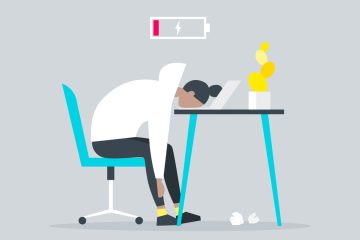4 WAYS YOU CAN SUPPORT YOUR SLEEP
The racing thoughts of anxiety will keep you awake or at least keep you in light, restless sleep that never really feels restorative. Then there’s the rumination of low mood and depression that can invade your dream time leaving you waking up constantly tired. Taking steps to improve your mental wellbeing can be a vital step in finally getting a good night’s sleep. In addition, there are some smaller, practical things you can do to improve your sleep hygiene, which you can read about below.
1) Set your sleep schedule
Having a set schedule normalises sleep as an essential part of your day and gets your brain and body accustomed to getting the full amount of sleep that you need.
– Have a fixed wake-up time: Regardless of whether it’s a weekday or weekend, try to wake up at the same time +/- 1 hour or you disrupt your circadian rhythm.
– Prioritise sleep: It might be tempting to skip sleep to work, study, socialise, or exercise, but it’s vital to treat sleep as a priority.
– Make gradual adjustments: If you want to shift your sleep times, make small, step-by-step adjustments so that you can get adjusted and settle into a new schedule.
– Don’t overdo it with naps: Naps can be a handy way to regain energy during the day, but they can throw off sleep at night. To avoid this, try to keep naps relatively short and limited to the early afternoon.
2) Follow a nightly routine
How you prepare for bed can determine how easily you’ll be able to fall asleep.
– Keep your routine consistent: Following the same steps each night, including things like putting on your pyjamas and brushing your teeth, can reinforce in your mind that it’s bedtime.
– Budget 30 minutes for winding down: Take advantage of whatever puts you in a state of calm such as soft music, light stretching, reading, and/or relaxation exercises.
– Unplug and dim your lights: Try to keep away from bright lights because they can hinder the production of melatonin, a hormone that the body creates to facilitate sleep. This includes mobile phones, which usually have a blue light filter setting to help with this.
– Focus on relaxing not sleep: Take the pressure off sleep and focus on relaxing your body instead. Progressive muscle relaxation, meditation, mindfulness, paced breathing, and other relaxation techniques are effective at shifting your nervous system into a state of calm.
– Don’t toss and turn: It helps to have a healthy mental connection between being in bed and actually being asleep. So if after 20 minutes you haven’t got to sleep, get up, read, or do something else calming in low light before trying to fall asleep again.
3) Cultivate healthy daily habits
It’s not just bedtime habits that play a part in getting good sleep. Incorporating positive routines during the day can support your circadian rhythm and limit sleep disruptions.
– Get daylight exposure: Light, especially sunlight, is one of the key drivers of circadian rhythms that can encourage quality sleep. Open the curtains or step outside as close to waking as you can.
– Be physically active: Regular exercise can make it easier to sleep at night and also delivers a host of other health benefits.
– Reduce alcohol and smoking: Alcohol may make it easier to fall asleep, but the effect wears off and it actually disrupts sleep overall, as does nicotine.
– Cut down on caffeine in the afternoon and evening: As a stimulant, caffeine can keep you wired even when you want to rest, so try to avoid it later in the day. Also be aware if you’re consuming lots of caffeine to try to make up for lack of sleep.
– Don’t eat late: Eating late, especially if it’s a big, heavy, or spicy meal, can mean you’re still digesting when it’s time for bed. In general, any food or snacks before bed should be on the lighter side.
– Restrict in-bed activity: To build a link in your mind between sleep and being in bed, it’s best to only use your bed only for sleep (with sex being the one exception).
4) Optimise your bedroom
A central component of sleep hygiene beyond just habits is your sleep environment. To fall asleep more easily, you want your bedroom to emanate tranquillity. While what makes a bedroom inviting can vary from one person to the next, these tips may help make it calm and free of disruptions:
– Have a comfortable mattress, pillow and bedding: These can be critical to comfort and pain-free sleep, make sure they match your needs and preferences.
– Set a cool yet comfortable temperature: Fine-tune your bedroom temperature to suit your preferences, but err on the cooler side (around 16-18 degrees Celsius).
– Block out light: Use heavy curtains or an eye mask to prevent light from interrupting your sleep.
– Drown-out noise: Ear plugs can stop noise from keeping you awake, and if you don’t find them comfortable, you can try a white noise machine or even a fan to drown out bothersome sounds.
– Try calming scents: Light smells, such as lavender, may induce a calmer state of mind.
Is sleep hygiene the same for everyone?
The basic concept of sleep hygiene — that your environment and habits can be optimised for better sleep — applies to just about everyone, but what ideal sleep hygiene looks like can vary based on the person. It’s worth testing different adjustments to find out what helps your sleep the most. You don’t have to change everything at once; small steps can move you toward better sleep hygiene.
It’s also important to know that improving sleep hygiene won’t always resolve sleeping problems. People who have serious insomnia or sleep disorders like obstructive sleep apnea may benefit from better sleep hygiene, but other treatments are usually necessary as well. In these cases it’s best to talk with a doctor who can recommend the most appropriate course of treatment.


